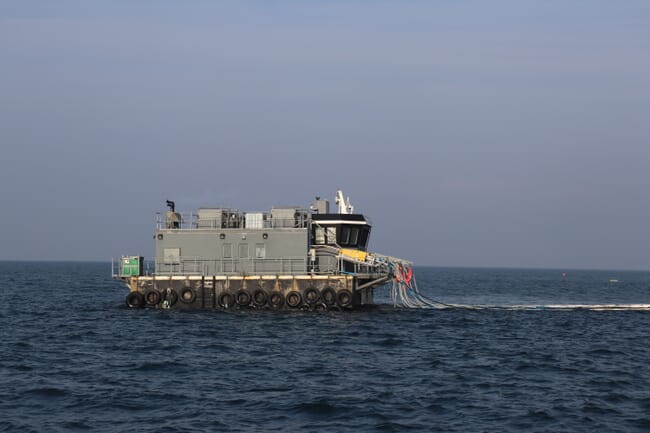The Scottish Salmon Producers Organisation (SSPO) described SEPA's proposal to introduce a feed cap as an example of “lazy regulation” which, if introduced, would raise significant fish health and welfare concerns and could undermine the global reputation for quality the sector has built up over the last few decades.

SEPA has proposed using "site specific limits on the quantity of feed that could be fed to farmed fish over a period of time as a means of controlling the quantity of organic wastes discharged."
They argue that: "This would have represented a move from our existing regulatory controls which limit the quantity of organic wastes discharged by setting site-specific limits on the maximum weight of fish (biomass) that can be held on a farm at any one time."
However, Julie Hesketh-Laird, chief executive of the SSPO, has now written to Terry A’Hearn, the chief executive of SEPA, raising serious concerns about the performance of the regulator.
On the consultation launched today by SEPA, which relates to controlling organic deposits from salmon farms, Ms Hesketh-Laird said: “SEPA’s decision to consider a feed cap as a way of controlling organic deposits from salmon farms has no environmental basis, is wrong, misguided and could threaten fish health and welfare. It would also undermine the global reputation for quality Scottish salmon that farmers have built up over decades.”
She added: “The consultation proposes to introduce a limit on the amount of feed given to salmon. But farmers must be able to judge the appropriate amount of feed necessary to rear their stock and keep them healthy. This sets a dangerous precedent for a regulator to limit how farmers feed their stock.
“They should not face arbitrary restrictions. Feed is central to fish health, welfare and growth. It is also key to achieving first-class quality and nutritional benefits for consumers. This consultation is simply lazy regulation. I am dismayed that SEPA is considering a system which has already been tried and rejected elsewhere. The Scottish salmon farming sector has worked effectively with SEPA’s existing biomass controls for many years and are committed to do so into the future.”
Ms Hesketh-Laird has written to Mr A’Hearn setting out a number of concerns about what she said was the “poor performance” of the regulator that stifles the sector and constrains sustainable growth. Licences for new salmon farms or for changes to existing farms should be determined by SEPA within 120 days. According to data collated by the SSPO, the average time for salmon farming applications to be dealt with by the regulator in April 2019 was 294 days.
Ms Hesketh-Laird said: “The relationship between a regulator and sector must be rigorous and call companies to account. But it must also be enabling. The delays in responding to applications are damaging on a day to day operational level but are also undermining strategic planning and decision-making. Salmon is a major player in Scotland’s food industry and a key contributor to the rural and national economy, so it deserves timely, efficient, strategic and enabling regulation.”
She added: “It is in all of our interests to nurture and protect Scotland’s marine environment but this is best done through strong, robust and clear regulation that enables the sustainable growth of aquaculture.”
David Harley, head of water & planning at the Scottish Environment Protection Agency, said: “As one of a number of organisations regulating finfish aquaculture, SEPA is working with the finfish aquaculture sector to ensure protection of the environment is recognised as fundamental to the sector’s success. Our vision is that the sector becomes a world-leading innovator in ways to minimise the environmental footprint of food production and supply; where it has a strong and positive relationship with neighbouring users of the environment and communities; and where it is valued nationally for its contribution to achieving global food security.
“Having done more science, more analysis and more listening than ever before over the last two years, including in our largest ever public consultation across Scotland, we launched our Finfish Aquaculture Sector Plan and a new, firm, evidence-based regulatory framework in June this year.
“This further consultation is focused on how we ensure that the organic load does not negatively impact local environments. We want to provide certainty and transparency to site operators, regulators and communities. We’re committed to listening and to getting this right which is why we’re asking for responses to options for approaches from the broadest possible group of stakeholders with interests in our regulation of the sector.”
The consultation is open to the public until 27 November.




